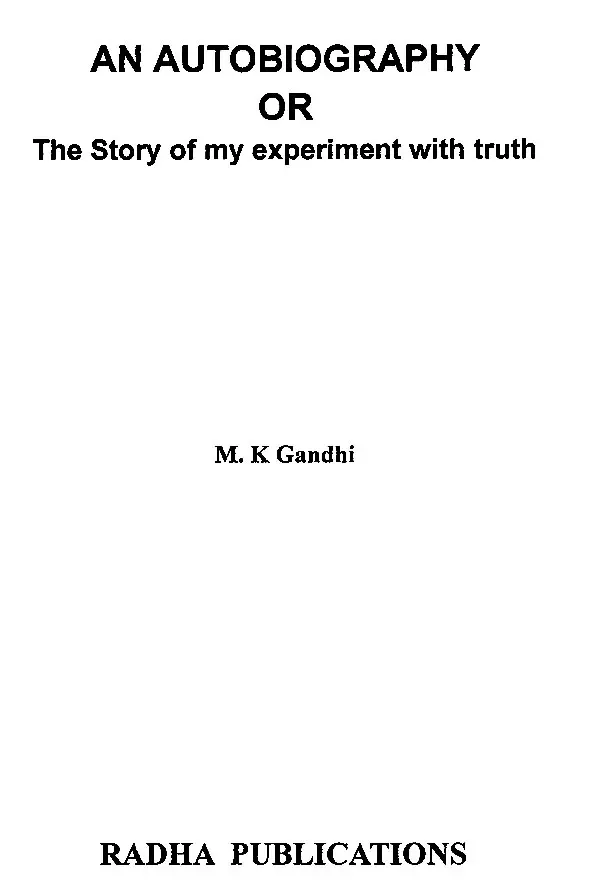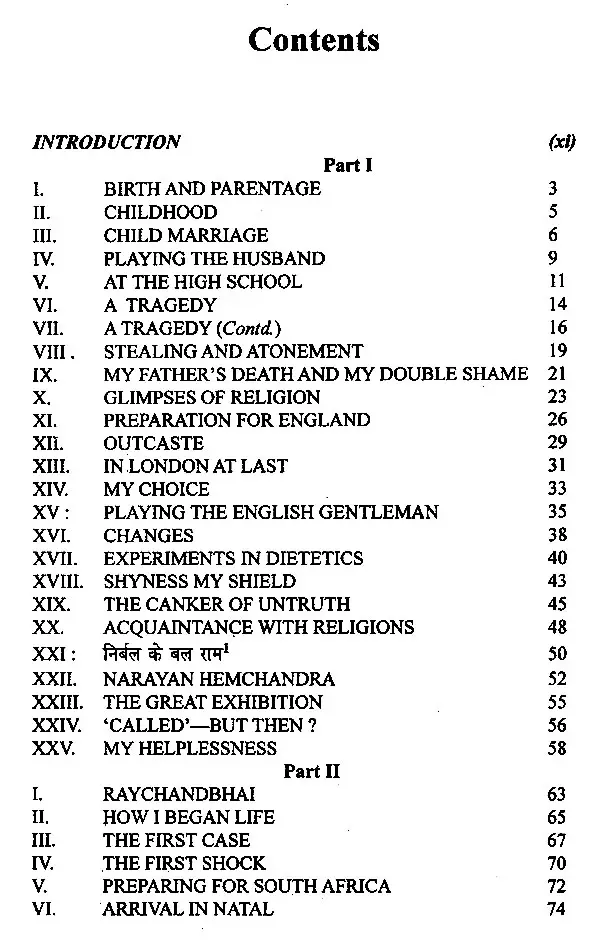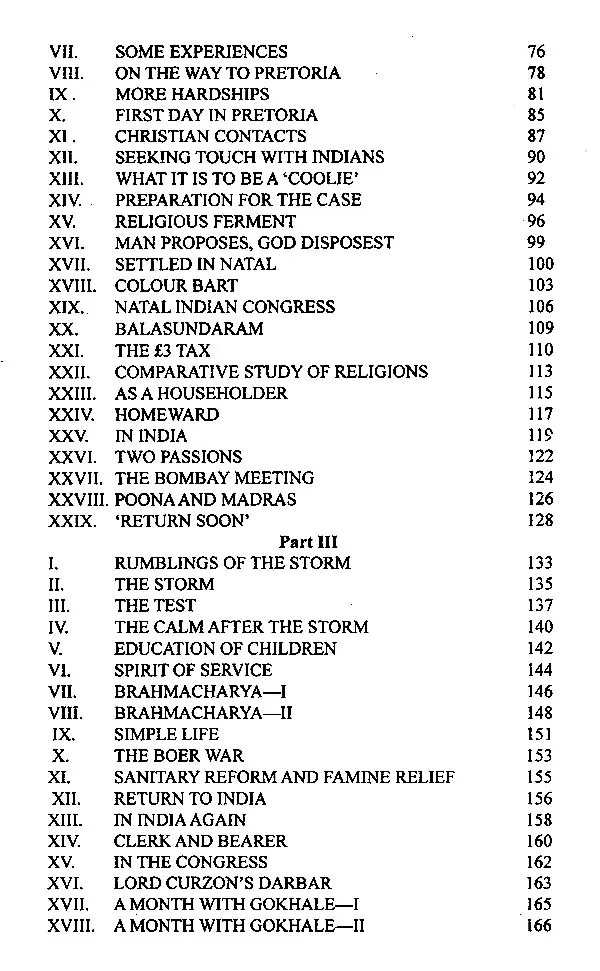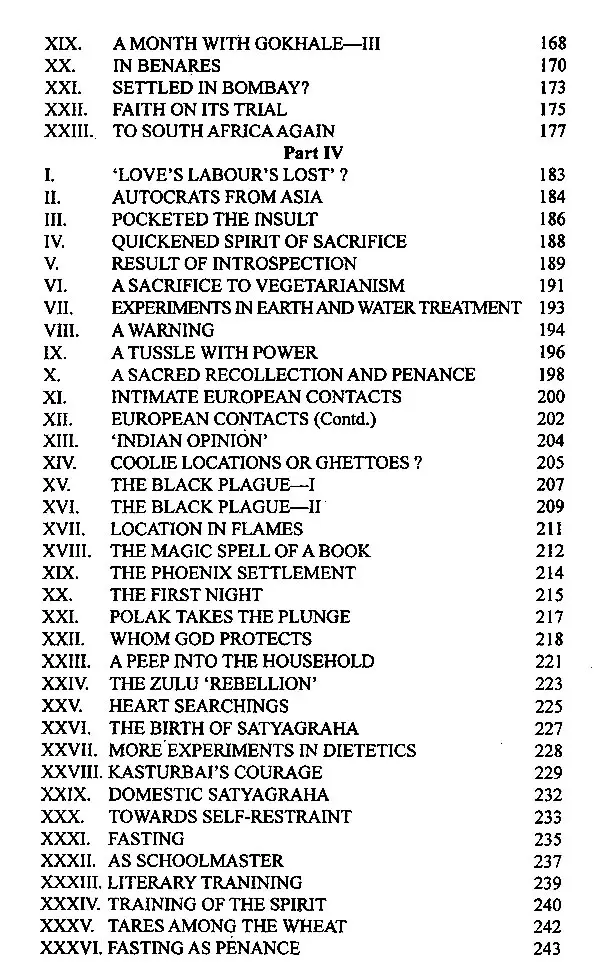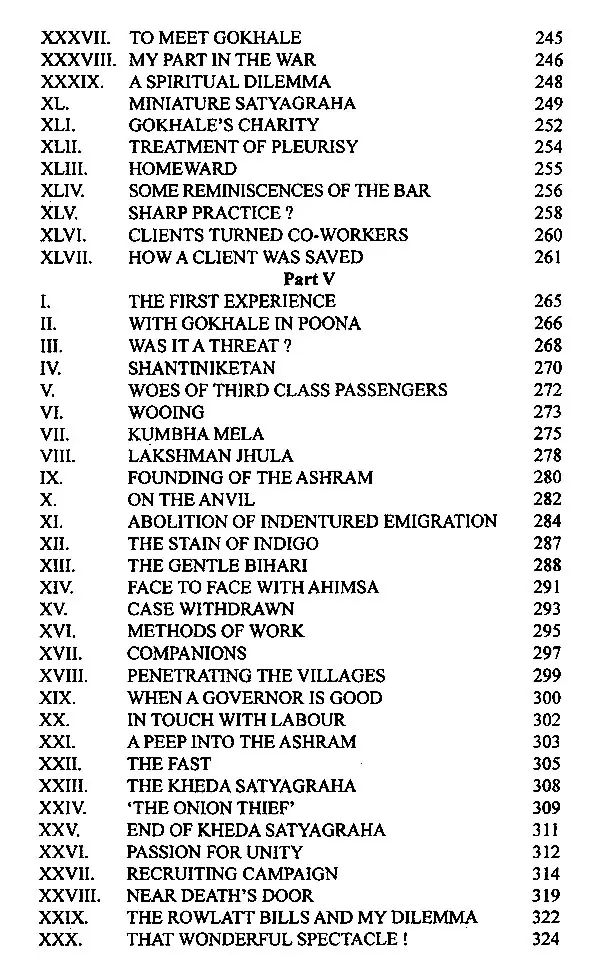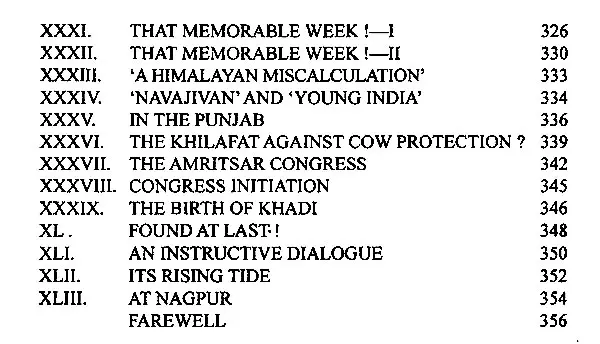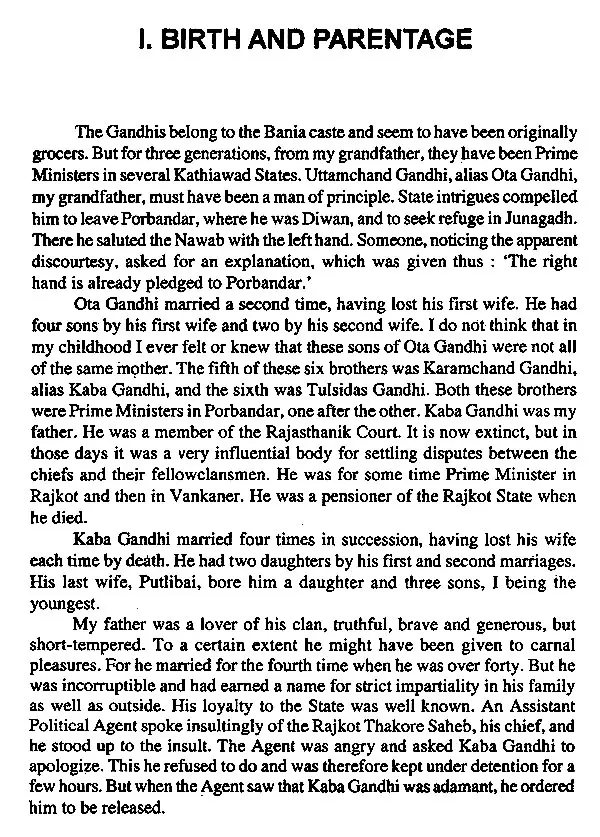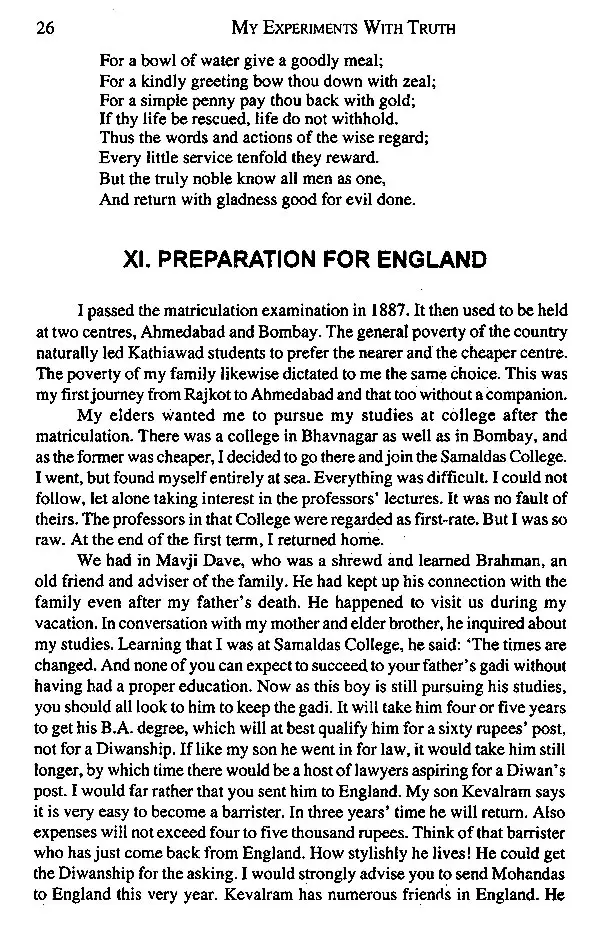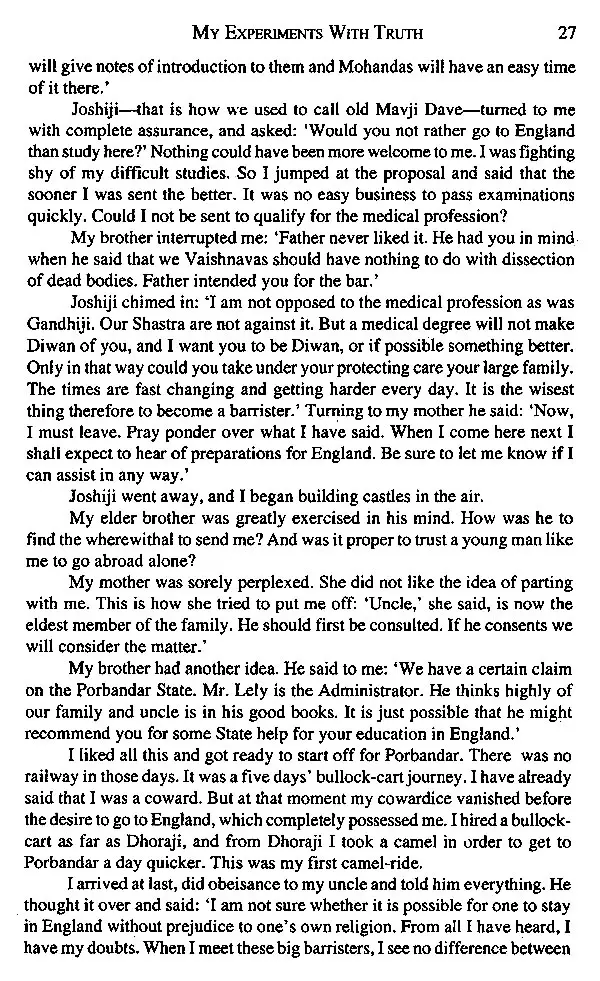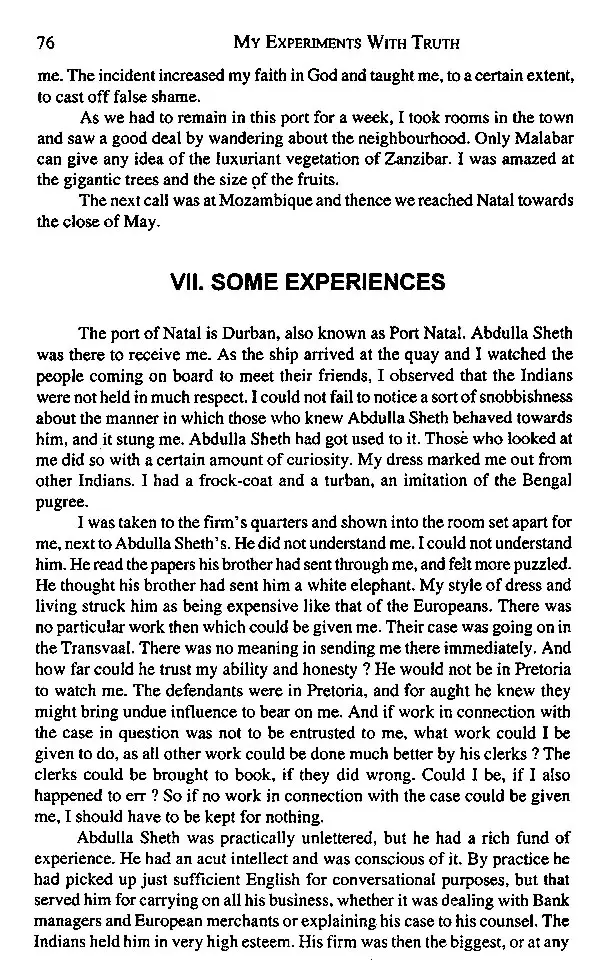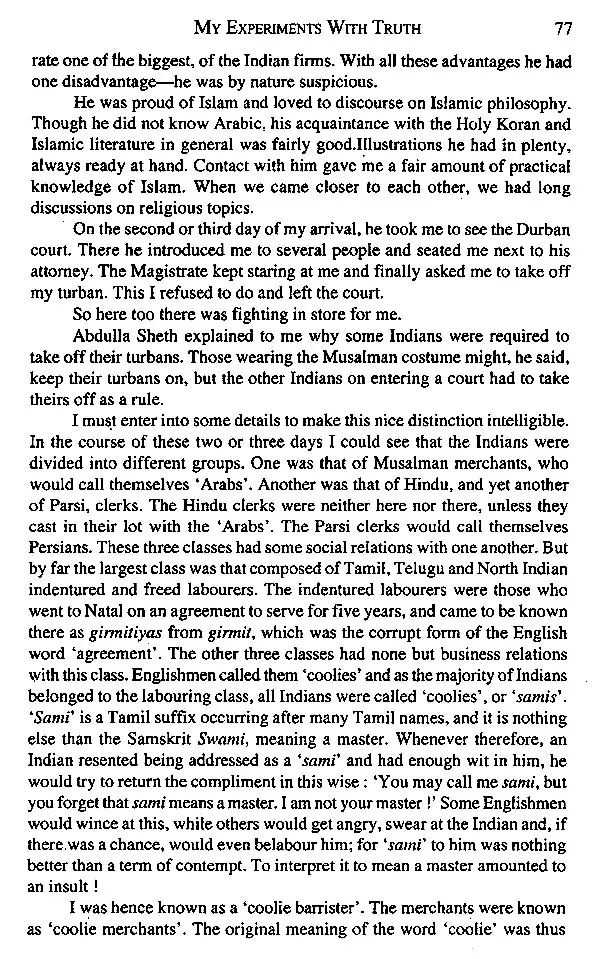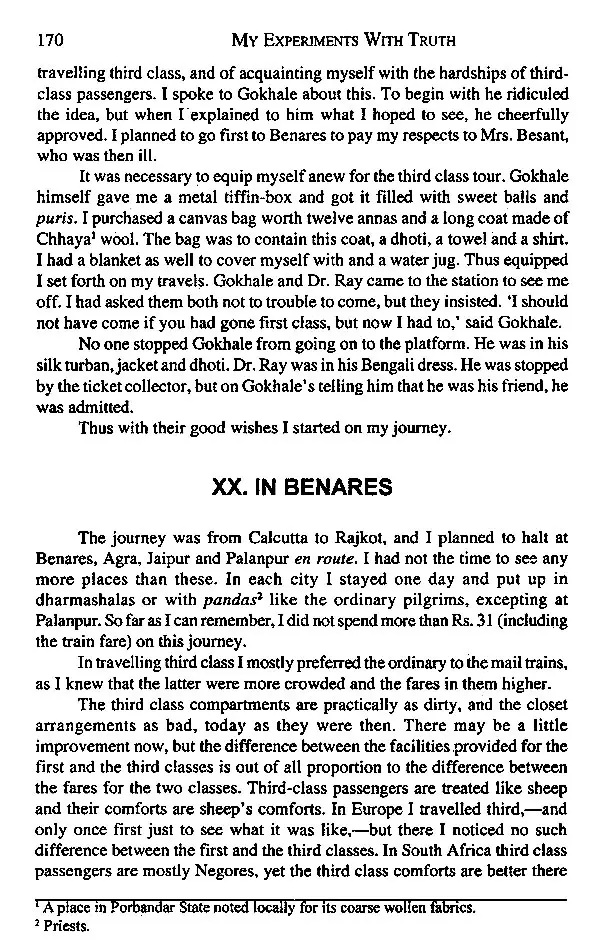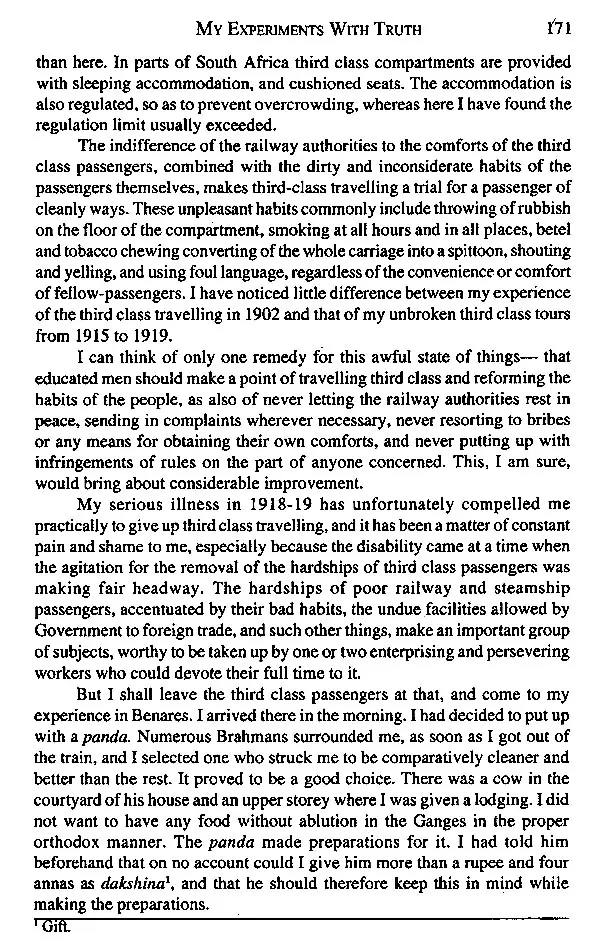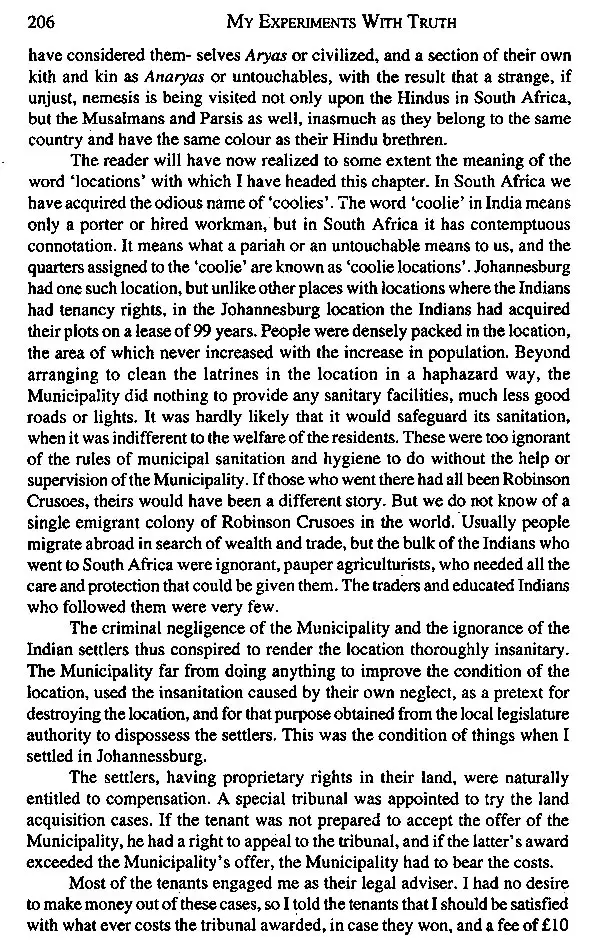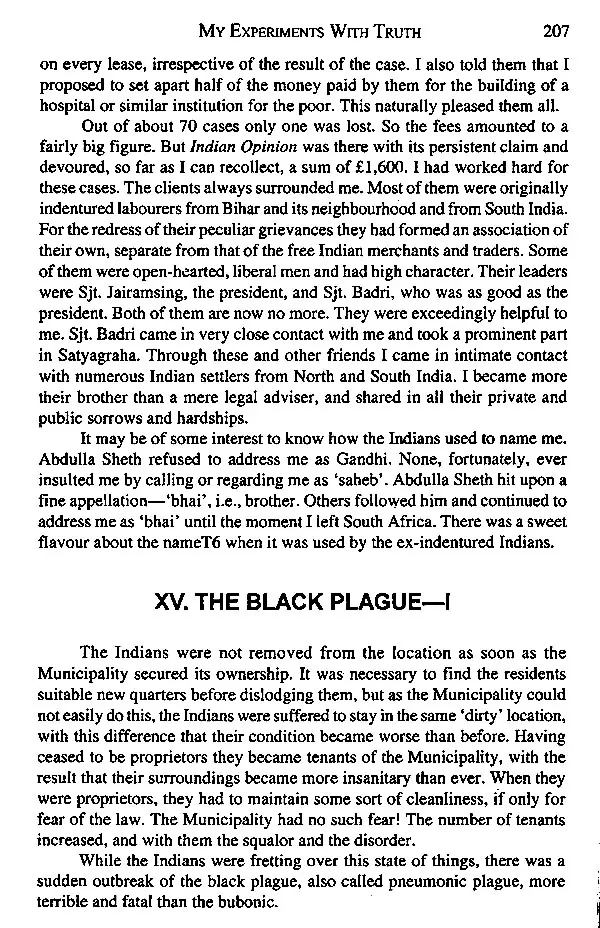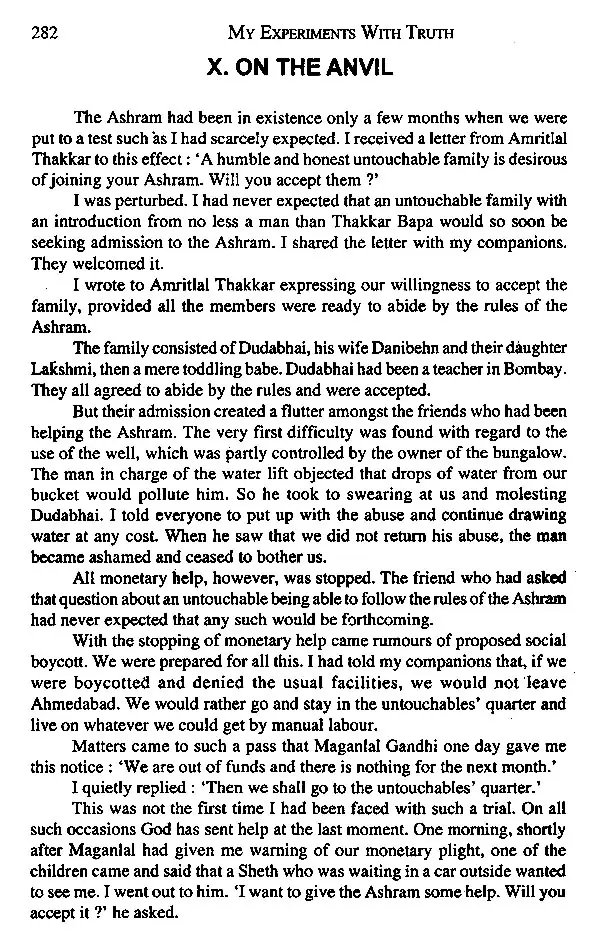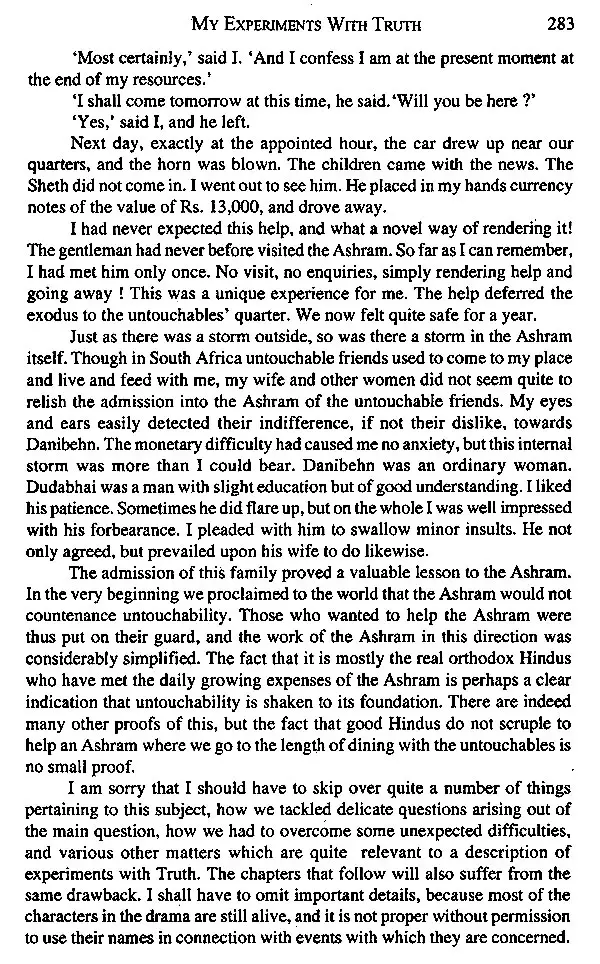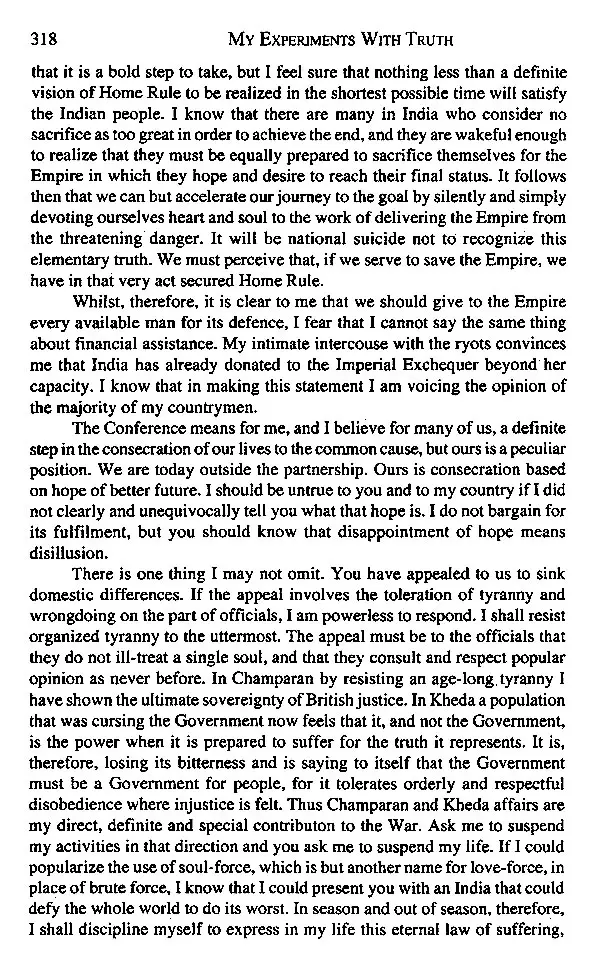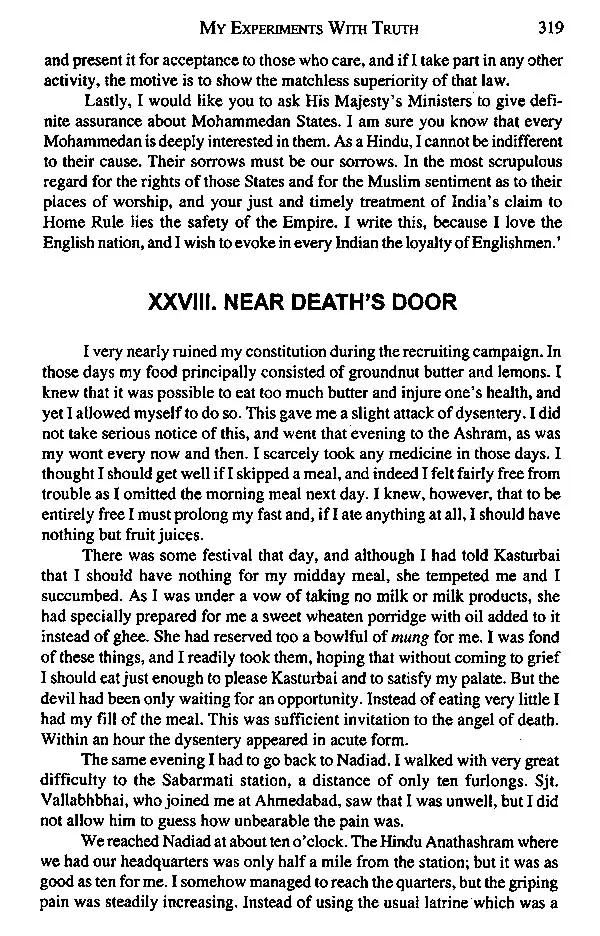
An Autobiography or The Story of My Experiment With Truth
Book Specification
| Item Code: | UAI141 |
| Author: | M. K Gandhi |
| Publisher: | Radha Publications, Delhi |
| Language: | English |
| Edition: | 2010 |
| ISBN: | 9788174876737 |
| Pages: | 370 |
| Cover: | HARDCOVER |
| Other Details | 9.00 X 6.00 inch |
| Weight | 540 gm |
Book Description
Mohandas Karamchand Gandhi was born on October 2, 1869 in Porbandar, India. He became one of the most respected spiritual and political leaders of the 1900's. GandhiJi helped free the Indian people from British rule through nonviolent resistance, and is honored by Indians as the father of the Indian Nation. At the age of 13 Gandhi married Kasturba, a girl the same age. Their parents arranged the marriage. The Gandhis had four children. Gandhi studied law in London and returned to India in 1891 to practice. In 1893 he took on a one-year contract to do legal work in South Africa.
At the time the British controlled South Africa. When he attempted to claim his rights as a British subject he was abused, and soon saw that all Indians suffered similar treatment. Gandhi stayed in South Africa for 21 years working to secure rights for Indian people.
He developed a method of action based upon the principles of courage, nonviolence and truth called Satyagraha. He believed that the way people behave is more important than what they achieve. Satyagraha promoted nonviolence and civil disobedience as the most appropriate methods for obtaining political and social goals. In 1915 Gandhi returned to India. Within 15 years he became the leader of the Indian nationalist movement.
Using the principles of Satyagraha he led the campaign for Indian independence from Britain. Gandhi was arrested many times by the British for his activities in South Africa and India. He believed it was honorable to go to jail for a just cause. Altogether he spent seven years in prison for his political activities.
On January 13, 1948, at the age of 78, he began a fast with the purpose of stopping the bloodshed. After 5 days the opposing leaders pledged to stop the fighting and Gandhi broke his fast. Twelve days later a Hindu fanatic, Nathuram Godse who opposed his program of tolerance for all creeds and religion. assassinated him.
The first edition of Gandhiji's Auotobiography was published in two volumes. Vol. I in 1927 and Vol in 1929. The original in Gujrarati which was priced at Rs. 1/- has run throuth five editions, nearly 50,000 copies having been sold. The price of the English translation (only issued in library edition) was prohibitive for the Indian reader, and a cheap edition has long been needed. It is now being issued in one volume. The translation, as it appeared serially in Young India, had now undergone careful recision, and from the point of view of language, it has had the benefit of careful revision by a revered friend, who, among many other things, has the reputation of being an eminent English scholar. Before undertaking the task, he made it a condition that his name should on no account be given out. I accept the condition. It is needless to say it heightens my sense of gratitude to him. Chapter XXIX-XLIII of part V were translated by my friend and colleague Pyarelal during my absence in Bardoli at the time of the Bardoli Agrarian Inquiry by the Broomfield Committee in 1928-29.
Four or five years ago, at the instance of some of my nearest coworkers I agreed to write my autobiography. I made the start, but scarcely had I turned over the first sheet when riots broke out in Bombay and the work remained at a standstill. Then followed a seriesof events which culminated in my imprisonment at Yeravdal Sjt. Jairamdas, who was one of my fellow-prisoners there, asked me to put everything else on one side and finish writing the autobiography. I replied that I had already framed a programme of study for myself, and that I could not think of doing anything else until this course was complete. I should indeed have finished the autobiography had I gone through my full term of imprisonment at Yeravda, for there was still a year left to complete the task, when I was discharged. Swami Anand3 has now repeated the proposal, and as I have finished the history of Satyagraha in South Africa, I am tempted to undertake the autobiography for Navajivan. The Swami wanted me to write it separately for publication as a book. But I have no spare time. I could ony write a chapter week by week. Something has to be written for Navajivan every week. Why should it not be the autobiography? The Swami agreed to the proposal, and here am I hard at work.
But a God-fearing friend had his doubts, which he shared with me on my day of silence. "What has set you on this adventure ?" he asked. "Writing an autobiography is a practice peculiar to the West. I know of nobody in the East having written one, except amongst those who have come under Western influence. And what will you write ? Supposing you reject tomorrow the things you hold as principles today, or supposing you revise in the future your plans of today, is it not likely that the men who shape their conduct on the authority of your word, spoken or written, may be misled? Don't you think it would be better T5 not to write anything like an autobiography, at any rate just yet?"
This argument had some effect on me. But it is not my purpose to attempt a real autobiography. I simply want to tell the story of my numerous experiments with truth, and as my life consists of nothing but those experiments, it is true that the story will take the shape of an auto-biography. But I shall not mind, if every page of it speaks only a connected account of all these experiments will not be without benefit to the reader. My experiments in the political field are now known, not only to India, but to a certain extent to the 'civilized' world. For me, they have not much value; and the title of 'Mahatma' that they have won for me has, therefore, even less. Often the title has deeply pained me; and there is not a moment I can recall when it may be said to have tickled me. But I should certainly like to narrate my experiments in the spiritual field which are known only to myself, and from which I have derived such power as I possess for working in the political field. If the experiments are really spiritual, then there can be no room for self-praise. They can only add to my humility. The more I reflect and look back on the past, the more vividly do I feel my limitations.
What I want to achieve, what I have been striving and pining to achieve these thirty years,-is self-realization, to see God face to face, to attain moksha'. I live and move and have my being in pursuit of this goal. All that I do by way of speaking and writing, and all my ventures in the political field, are directed to this same end. But as I have all along believed that what is possible for one is possible for all, my experiments have not been conducted in the closet, but in the open; and I do not think that this fact detracts from their spiritual value. There are some things which are known only to oneself and one's Maker. These are clearly incommunicable. The experiments I am about to relate are not such. But they are spiritual, or rather moral; for the essence of religion is morality.
Only those matters of religion that can be comprehended as much by children as by older people, will be included in this story. If I can narrate them in a dispassionate and humble spirit, many other experimenters will find in them provision for their onward march. Far be it from me to claim any degree of perfection for these experiments. I claim for them nothing more than does a scientist who, though he conducts his experiments with the utmost accuracy, forethought and minuteness, never claims any finality about his conclusions, but keeps an open mind regarding them. I have gone through deep self-introspection, searched myself through and through, and examined and analysed every psychological situation. Yet I am far from claiming any finality or infallibility about my conclusions. One claim I do indeed make and it is this. For me they appear to be absolutely correct, and seem for the time being to be final. For if they were not, I should base no action on them. But at every step I have carried out the process of acceptance or rejection and acted accordingly. And so long as my acts satisfy my reason and my heart, I must firmly adhere to my original conclusions.
If I had only to discuss academic principles, I should clearly not attempt an autobiography. But my purpose being to give an account of various practical applications of these principles, I have given the chapters I propose to write the title of The Story of My Experiments with Truth. These will of course include experiments with non-violence, celibacy and other principles of conduct believed to be distinct from truth. But for me, truth is the sovereign principle, which includes num-erous other principles. This truth is not only truthfulness in word, but truthfulness in thought also, and not only the relative truth of our conception, but the Absolute Truth, the Eternal Principle, that is God. There are innumerable definitions of God, because His manifestations are innumerable. They overwhelm me with wonder and awe and for a moment stun me. But I worship God as Truth only. I have not yet found Him. but I am. seeking after Him. I am prepared to sacrifice the things dearest to me in pursuit of this quest. Even if the sacrifice demanded be my very life. I hope I may be prepared to give it. But as long as I have not realized this Absolute Truth, so long must I hold by the relative truth as I have conceived it. That relative truth must, meanwhile, be my beacon, my shield and buckler. Though. this path is strait and narrow and sharp as the razor's edge, for me it has been the quickest and easiest. Even my Himalayan blunders have seemed trifling to me because I have kept strictly to this path. For the path has saved me from coming to grief, and I have gone forward according to my light. Often in my progress I have had faint glimpses of the Absolute Truth, God, and daily the conviction is growing upon me that He alone is real and all else is unreal. Let those, who wish, realize how the conviction has grown upon me; let them share my experiments and share also my conviction if they can. The further conviction has been growing upon me that whatever is possible for me is possible even for a child, and I have sound reasons for saying so. The instruments for the quest of truth are as simple as they are difficult. They may appear quite impossible to an arrogant person, and quite possible to an innocent child. The seeker after truth should be humbler than the dust. The world crushes the dust under its feet, but the seeker after truth should so humble himself that even the dust could crush him. Only then, and not till then, will he have a glimpse of truth. The dialogue between Vasishtha and Vishwamitra makes this abundantly clear. Christianity and Islam also amply bear it out.
